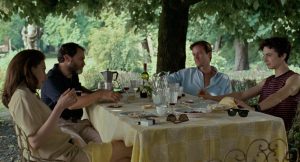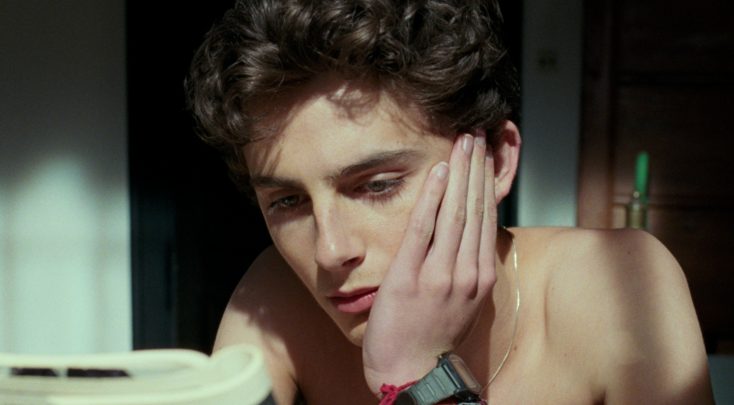
Amira Casar, Michael Stuhlbarg, Armie Hammer, and Timothée Chalamet in CALL ME BY YOUR NAME. ©Sony Pictures.
By ANGELA DAWSON
Front Row Features
HOLLYWOOD—At 23, “Call Me By Your Name” star Timothee Chalamet is breaking all kinds of records. He is the third youngest actor ever to receive an Academy Award nomination in the Best Actor category, and the youngest in that category since 1939.
The New York native, best know for his recurring role on the TV series “Homeland,” already has received numerous critics awards for his leading role performance as teenager who experiences first love in the 1983-set film. The drama is based on the acclaimed novel by Andre Aciman, and was adapted for the screen by legendary filmmaker James Ivory and helmed by Italian director Luca Guadagnino.
Prior to the film’s release in the U.S. last fall, Chalamet could not conceive how warmly the period romance between two young men discovering their true sexual identity would be received by audiences. Nor could he imagine how much he would be thrust in the spotlight for his remarkable performance.
In an interview, the tall and slim actor spoke about making the film and co-starring with Hammer and taking some comfort in “nobody knowing who I am.” Chalamet, who has since become world-famous, plays 17-year-old Elio, an Italian-American who is spending the summer with his progressive, intellectual parents in their 17th century villa in the Old Country. The restless youngster spends his days transcribing and playing classical music, reading and flirting with his local friend Marzia (Esther Garrel). The humdrumness of the summer is lifted when a dashing grad student Oliver (“The Lone Ranger’s” Armie Hammer) comes to work for Elio’s professor father (Michael Stuhlbarg). Initially put off by the 24-year-old’s carefree attitude, Elio soon finds himself enamored with the charming stranger, and those feelings are gradually reciprocated, but he wonders if his parents will accept his newfound sexual orientation, and his relationship with a slightly older partner. The coming-of-age film also has picked up three other Oscar nominations, including Best Picture.
Chalamet has been acting much of his life. After appearing in TV commercials as a child, he attended a performing arts high school and then briefly attended Columbia University and NYU before dropping out to focus on his acting career. He guest-starred on a number of TV shows and made his feature film debut in 2014 in Jason Reitman’s “Men, Women & Children.” On the TV series “Homeland,” he had an eight-episode arc as the rebellious son of the Vice President. Other film and TV roles have followed in quick succession. Chalamet has supporting roles in the Oscar-nominated drama “Lady Bird,” (which also is up for Best Picture), and briefly appears as an 1890s soldier in the acclaimed Western “Hostiles.”
Q: How intimidating did this project seem to you when you were presented with this script? How did you overcome any concerns you had?
Chalamet: I would take my cue from what Luca (Guadagnino, the director) said because, as an actor on any project, particularly as a young actor, you look to your director for the emotional cue of how the day’s going at the start every day. Luca was always all-confident and knew exactly what he wanted and was so secure in what we were doing that it alleviated any tension for me as a performer. Also, for me, I have the tremendous gift of absolutely nobody knowing who I am, so it’s not like I have anything on the line, really.
Q: How did you get to know your character, and what did you take away from playing Elio? How did you and Armie Hammer get along?
Chalamet: There was a tremendous gift in working with source material in any sort of novel and particularly in getting to play Elio as opposed to Oliver. It’s very much a first-person narrative. It’s funny, Armie (Hammer recorded) the audio book, but he never wanted to read the book on set, because it’s so fiercely (told from) the view of Elio. If you draw your character from that, and I’m not a purest in the sense that the parts of myself that bleed into the character appropriately, but you want to know the parts of you that are contemporary or would make sense in 1983. Then comes the relationship, and reality, more than anything, more than the relationship that really just flowered by way of experience and time spent with one another.
(Armie and I) just had the random luck of the universe where we just got along naturally as human beings and really struck up a friendship on set that has since flowered in the year and a half since. It’s 80 percent fraternal and 80 percent of the time he’s a brother and then 20 percent of the time I’ve got to call him about something adult-oriented in my life that doesn’t make any sense to me. Then, when it comes time to shooting it, you just let it all go and just hope that, the rule for me is just to not be boring. You don’t want to plan entertaining, or you don’t want to do random interesting things and yet the audience has paid good money to be there.
Also, we were in the best of hands with Luca, and there are a number of artificial and bad takes that just simply aren’t in the movie because they were cut, thankfully.
Q: For the end scene over the credits, did you develop an inner-monologue for yourself? Did you switch out different thoughts for different takes?
Chalamet: It was the gift of being able to have an earpiece there that was actually playing (Sufjan Stevens’) song “Visions of Gideon” throughout that take, and there’s a certain structure that song takes narratively that is perfect for the film, because it’s kind of analogous to the way the relationship is played out and this feeling of love lost but also don’t cry because it’s over but smile because it happened.
It was, like any other scene in the movie, the comfort of being in front of Luca’s camera and that we did it three different ways: one that was very restrained, one that was less restrained and a third one that was the least restrained. Then when it came time to do it, that was the third to last day of production, so anything like first-day jitters are really out the window at that point. Then there was the added benefit too that because the camera was (from the angle of) the fire, there was nobody behind it. So, I was just staring into the fire.
As far as in inner-monologue goes, I got a great warning from a drama teacher when I was 13 years old, who said you want to be careful about drawing from personal experiences, because you just don’t want to blur that line too much. You want to protect yourself emotionally in your real life. Yet, for a close up that’s that long, things that read inauthentic will just ruin the whole thing, so luckily there’s enough in this short experience that I have that I was able to pull from, and not too much. Then when it came time to do it, it was just following what Luca wanted from take to take, and what different things he wanted.





